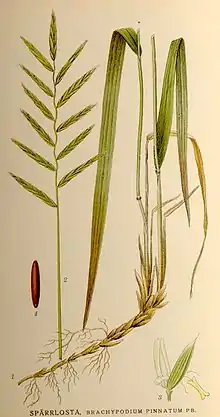| Brachypodium | |
|---|---|
 | |
| Brachypodium pinnatum[1] | |
| Scientific classification | |
| Kingdom: | Plantae |
| Clade: | Tracheophytes |
| Clade: | Angiosperms |
| Clade: | Monocots |
| Clade: | Commelinids |
| Order: | Poales |
| Family: | Poaceae |
| Clade: | BOP clade |
| Subfamily: | Pooideae |
| Tribe: | Brachypodieae Harz (1880) |
| Genus: | Brachypodium P.Beauv. 1812 not Brid. 1826 (a bryophyte) |
| Type species | |
| Brachypodium pinnatum | |
| Synonyms[4] | |
| |
Brachypodium is a genus of plants in the grass family, widespread across much of Africa, Eurasia, and Latin America.[5][6][7][8][9][10] The genus is classified in its own tribe Brachypodieae.[11]
Flimsy upright stems form tussocks. Flowers appear in compact spike-like racemes with 5-25 flowers on each short-stalked spikelet in summer. Leaves are flat or curved.[12][13]
According to a study published in 2010, there is evidence of Brachypodium and cattail (Typha spp.) residues occurring on prehistoric human grinding tools dated 28,000 years ago from Bilancino in central Italy.[14] Another contemporaneously published study stated that the grain residues resemble Brachypodium, based on a comparison to two modern specimens: "Among these, the grains, which are slightly angular, with hardly visible centric, point-shaped hila and adequate dimensions (in the sample measuring 9–14 μm), appeared very similar to those of Brachypodium or related genera."[15]
- Brachypodium × ambrosii - Spain
- Brachypodium × apollinaris - Spain
- Brachypodium arbusculum - Canary Islands
- Brachypodium bolusii - Lesotho, South Africa
- Brachypodium × cugnacii - Denmark, Ireland, France, Czech Republic
- Brachypodium × diazii - Spain
- Brachypodium distachyon - Mediterranean, Sahara, Sahel, southwest Asia from Portugal + Cape Verde to Sudan + Ukraine + Tibet
- Brachypodium firmifolium - Cyprus
- Brachypodium flexum - Africa from Sierra Leone to KwaZulu-Natal + Madagascar
- Brachypodium humbertianum - Madagascar
- Brachypodium kawakamii - Taiwan
- Brachypodium kotschyi - Turkey
- Brachypodium madagascariense - Madagascar
- Brachypodium mexicanum - Mexico, Central America, Venezuela, Colombia, Ecuador, Peru, Bolivia
- Brachypodium perrieri - Madagascar
- Brachypodium phoenicoides - Mediterranean from Portugal + Morocco to Greece
- Brachypodium pinnatum - Africa + Eurasia from Ireland + Morocco to China + Yakutia
- Brachypodium pringlei - Mexico (Nuevo León, Tamaulipas, Coahuila)
- Brachypodium retusum - Mediterranean + nearby areas from Portugal + Morocco to Ethiopia + Caucasus
- Brachypodium sylvaticum - Africa + Eurasia from Ireland + Morocco to Korea + New Guinea
- formerly included[4]
numerous species once considered members of Brachypodium but now considered better suited to other genera: Agropyron Anthosachne Arundinella Brachyelytrum Brachysteleum Catapodium Cutandia Distichlis Elymus Festuca Festucopsis Lolium Micropyrum Poa Ptychomitrium Rostraria Triticum Vulpia
See also
References
- ↑ painting by the Swedish botanist C. A. M. Lindman (1856–1928), taken from his book(s) Bilder ur Nordens Flora (first edition published 1901–1905, supplemented edition 1917–1926?).
- ↑ lectotype designated by Niles & Chase, Contr. U.S. Natl. Herb. 24: 196 (1925)
- ↑ Tropicos, Brachypodium P. Beauv.
- 1 2 3 Kew World Checklist of Selected Plant Families
- ↑ Palisot de Beauvois, Ambroise Marie François Joseph. 1812. Essai d'une Nouvelle Agrostographie 100-101 in Latin
- ↑ Palisot de Beauvois, Ambroise Marie François Joseph. 1812. Essai d'une Nouvelle Agrostographie plante XIX (19), figure III (3 a-f) line drawings of Brachypodium pinnatum
- ↑ Flora of China, Vol. 22 Page 368 短柄草族 duan bing cao zu Poaceae Tribe Brachypodieae
- ↑ Flora of Pakistan, Brachypodium P. Beauv.
- ↑ Altervista Flora Italiana, genere Brachypodium
- ↑ Sanbi Red List of South African Plants
- ↑ Soreng, Robert J.; Peterson, Paul M.; Romaschenko, Konstantin; Davidse, Gerrit; Teisher, Jordan K.; Clark, Lynn G.; Barberá, Patricia; Gillespie, Lynn J.; Zuloaga, Fernando O. (2017). "A worldwide phylogenetic classification of the Poaceae (Gramineae) II: An update and a comparison of two 2015 classifications". Journal of Systematics and Evolution. 55 (4): 259–290. doi:10.1111/jse.12262. hdl:10261/240149. ISSN 1674-4918.

- ↑ Watson L, Dallwitz MJ. (2008). "The grass genera of the world: descriptions, illustrations, identification, and information retrieval; including synonyms, morphology, anatomy, physiology, phytochemistry, cytology, classification, pathogens, world and local distribution, and references". The Grass Genera of the World. Retrieved 2009-08-19.
- ↑ Lord, Tony (2003) Flora : The Gardener's Bible : More than 20,000 garden plants from around the world. London: Cassell. ISBN 0-304-36435-5
- ↑ Callaway, Ewen (October 18, 2010). "Stone Age flour found across Europe". naturenews. Retrieved October 12, 2011.
- ↑ Revedin, Anna; et al. (November 2, 2010). "Thirty thousand-year-old evidence of plant food processing". Proceedings of the National Academy of Sciences of the United States of America. 107 (44): 18815–18819. Bibcode:2010PNAS..10718815R. doi:10.1073/pnas.1006993107. PMC 2973873. PMID 20956317.
- ↑ The Plant List search for Brachypodium